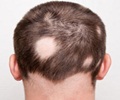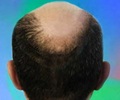Researchers have found that ruxolitinib and tofacitinib used for bone marrow malignancy and arthritis can help regrow hair lost due to alopecia areata.
Highlights
- Alopecia areata leads to hair loss in patches or in large clumps that could even lead to total hair loss.
- It is an auto-immune condition that has no known cure.
- Study utilizes ruxolitinib, earlier used for bone marrow malignancies and tofacitinib, earlier used for arthritis.
- 95% hair regrowth witnessed among alopecia areata after the use of these drugs for 3 months.
Director of the Clinical Research unit in Columbia, Dr. Julian Mackay-Wiggan said “Although our study was small, it provides crucial evidence that JAK inhibitors may constitute the first effective treatment for people with alopecia areata. This is encouraging news for patients who are coping with the physical and emotional effects of this disfiguring autoimmune disease.”
Alopecia areata is an autoimmune disorder where the body’s immune system fights against its own cells, in this case the hair follicles, leading to the loss of hair in patches.
This condition occurs both in males and in females, even children have been found to be affected. The loss of hair in patches could be a very small patch or it can lead to the loss of total hair, even on the eyebrows.
Though this condition is not life-threatening, the emotional implications are considerably huge, as an individual’s hair is considered their crowning glory.
Study of Ruxolitinib on Alopecia Areata
- Patients were given 20mg of ruxolitinib twice daily for a period of 3 to 6 months.
- Patient follow up was carried out for an additional 3 months.
- Hair regrowth was 50% or greater.
- 77% of patients who responded to the treatment showed 95% hair regrowth.
- A third of the patients had significant hair loss after stoppage of the medication but not till the level of hair loss prior to treatment.
- Lower level of cytotoxic T cells
- Interferon signaling
- Increased hair keratin
Dr. Angela M. Christiano who is the Professor of Genetics and Development at Columbia University Medical Center said “We are very excited about the use of biomarkers to follow the response of patients to this treatment. This will allow us to so monitor improvements in their gene expression signatures even before hair growth appears.”
Study of Tofacitinib on Alopecia Areata
Researchers from Yale University studied the effect of a medication for arthritis, tofacitinib, on alopecia areata.
- 66 patients were included in the study.
- 5mg of tofacitinib was administered, two times a day for three months.
- More than 50% of the patients witnessed hair regrowth.
- 1/3rd witnessed greater than 50% of hair regrowth after a period of 3 months.
Mechanism of Action
Researchers from Columbia University identified the signaling pathways and immune cells that were responsible for attacking the hair follicles and making them dormant. When topical and oral Janus Kinase family of inhibitors were introduced into mouse and human hair follicles, the hair follicles regained their active state while the signaling pathways were blocked.
Side Effects
There were minor side effects that were caused due to the use of these drugs that included skin infections, skin allergy and lowered hemoglobin levels that were reversed when the dosage of the medications were adjusted.
These drugs hold a lot of promise in the treatment of alopecia areata that has greatly affected the self perception of many patients worldwide. The psychological ramifications of this condition, far outreaches the physical implications, with the identification of this drug, promising to raise hopes of a cure.
References:
- Questions and Answers about Alopecia Areata - (http://www.niams.nih.gov/health_info/alopecia_areata/)
















